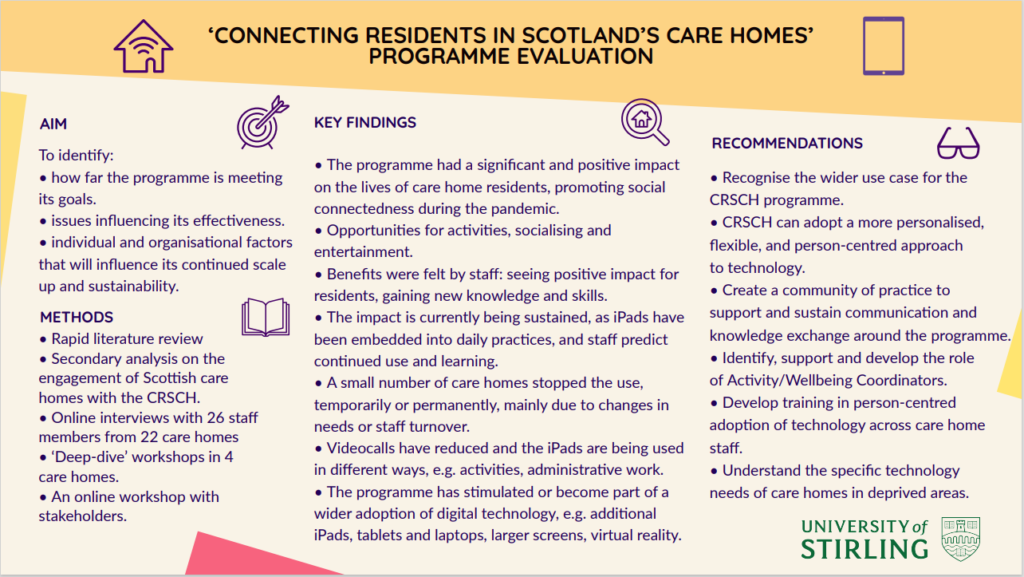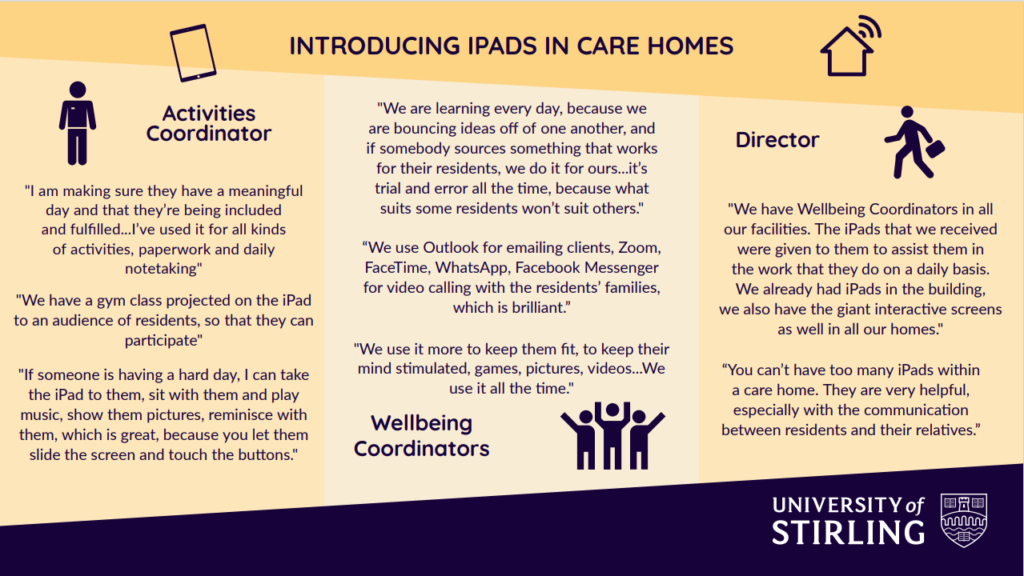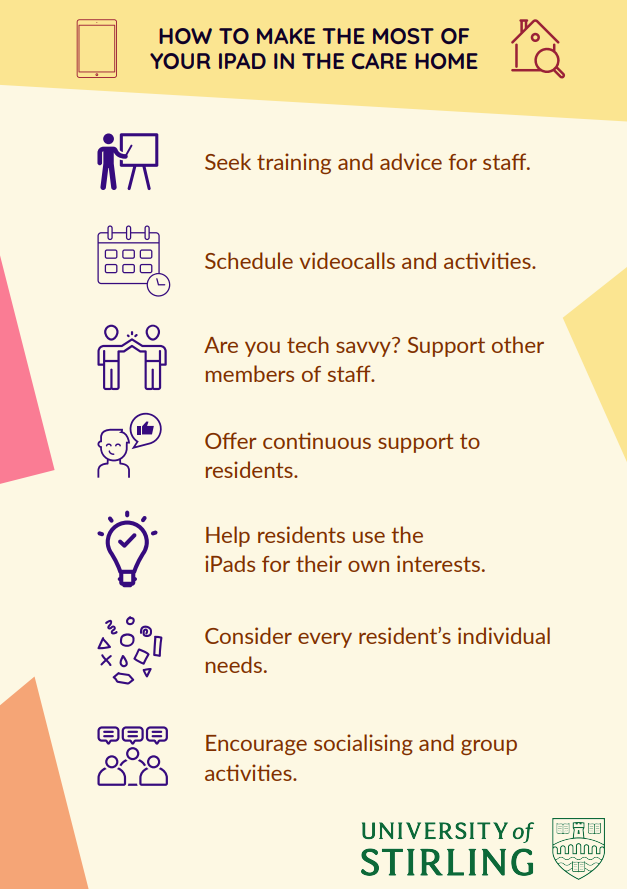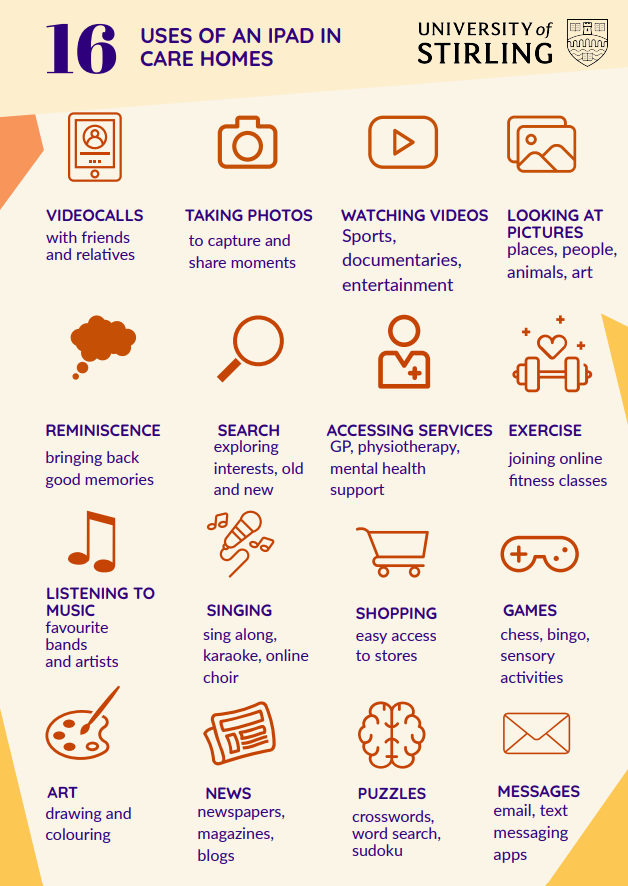Digital Social Care Resources
Welcome to the Digital Social Care resource page.
Skip Links: Social Care Digital Compendium, Newsletters, Partnership Sites, Connecting Residents in Scotland’s Care Homes, Telecare Uptake Optimisation, Lifestyle Monitoring, Enhanced Responder Service, Video Consulting: Near Me, TEC Advisors, Rapid Access Team, Joined-up Working, Wellbeing
Care Homes
Care Home Action Plan (Dec 2020, pdf)
Case Study: Introducing digital activities to Care Home residents (2021, pdf)
Deanfield Care Home Activities Coordinator, Nicole Winterbottom, integrates digital dimensions into daily residents’ activities using tablet technology supplied via public sector funding channels, including the TEC Connecting Scotland’s Care Homes initiative, part of the Scottish Government’s 2020 Covid-19 pandemic response.
Digital Health, Housing & Care Learning Network – 26th May 2021
Presentation on the Digital Approaches in Care Homes programme by Rikke Iversholt and Aileen MacLachlan.
Social Care Digital Compendium
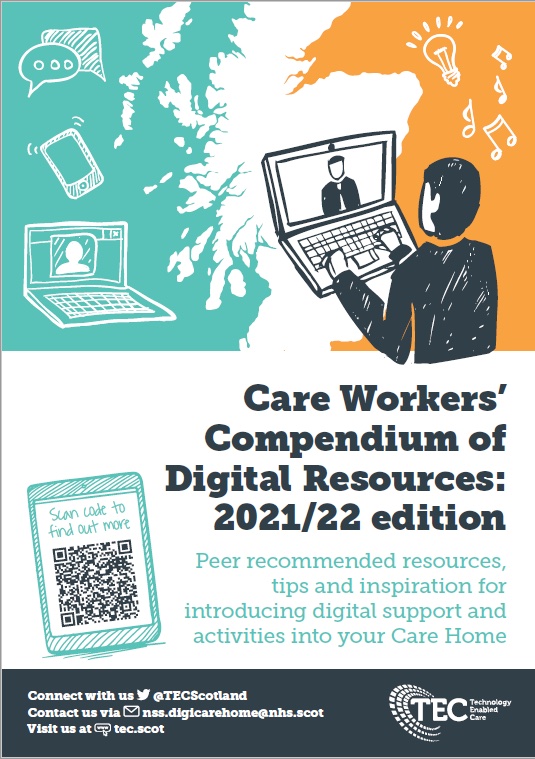
The TEC Digital Social Care Programme has collated our Digital Champions’ top tips and recommended resources for introducing digital support and activities into Care Homes into the first Care Workers’ Compendium of Digital Resources 2021/22 edition (pdf).
This practical resource has been developed with the contributions care homes made during the Digital Care Homes Network sessions this year and supplemented with case studies of digital use in care homes that have been shared with the TEC programme.
This resource gives an overview of what digital opportunities can look like for care services and how staff can be supported to improve the use of digital devices in care homes.
Digital Social Care Newsletters
Digital Social Care Partnership Websites
SCVO – Scottish Council of Voluntary Organisations
SSSC – The Scottish Social Services Council
Digital Health and Care Innovation Centre
CCPS – Coalition of Care and Support Providers in Scotland
NCSC – National Cyber Security Centre
Connecting Residents in Scotland’s Care Homes – Evaluation

The evaluation of the ‘Connecting Residents in Scotland’s Care Homes’ (CRSCH) programme was undertaken by a team of researchers from the University of Stirling between December 2021 and July 2022 and was commissioned by the Scottish Government Technology Enabled Care programme in conjunction with the Digital Health and Care Innovation Centre (DHI).
Part of the wider ‘Connecting Scotland’ programme, the Connecting Residents in Scotland’s Care Homes Programme was launched in November 2020 by the Scottish Government with the goal of equipping all Care Homes within Scotland with digital devices, as well as the necessary training for staff. The project aimed to support social connectedness for residents, to help address the negative impact on resident wellbeing caused by lockdowns and restrictions during the COVID-19 pandemic.
The evaluation adopted a range of research methods to engage with all relevant stakeholders, including residents, care staff, managers, family and friends of residents, and policymakers. The evaluation goals were to identify:
- how far the programme is meeting its objectives
- the issues influencing its effectiveness
- the individual and organisational factors that will influence its continued scale up and sustainability over the longer term.
The evaluation adopted the NASSS framework (Greenhalgh et al 2017) to ensure an approach that encompasses individual and organisations factors impacting the success of the programme as well the influence of the wider policy and practice context.
The CRSCH project was found to have a significant and positive impact on the lives of care home residents, promoting social connectedness during the pandemic and providing opportunities for activity and entertainment. Benefits from the programme were also felt by staff who appreciated the benefits for residents and gained new knowledge and skills. There was clear evidence that the impact of the project is being sustained and that the tablet computers provided by CRSCH are being used in many new ways. The CRSCH programme has stimulated further digital adoption within care homes that is supporting and enabling staff and residents to engage with digital technology in new and creative ways with positive impact.
The evaluation concluded with the following recommendations:
- Recognise the wider use case for the CRSCH programme.
- CRSCH can adopt a more personalised, flexible, and person-centred approach to technology.
- Create a community of practice to support and sustain communication and knowledge exchange around the programme.
- Identify, support and develop the role of Activity/Wellbeing coordinators.
- Develop training in person-centred adoption of technology across care home staff.
- Understand the specific technology needs of care homes in deprived areas.
Executive Summary and Final Report
The Executive Summary and Evaluation Report are available from the University of Stirling’s website.
Evaluation Infographics
Optimising the Uptake of Telecare
Optimising the Uptake of Telecare – Overview v1.0 (2021, pdf)
Charge Free Introductory Period for Telecare v1.0 (2021, pdf)
Promoting the use of the Self Check Online Telecare tool v1.0 (2021, pdf)
Short Video: Telecare Charge Free Introductory Period
Improving Awareness, Knowledge & Assessment v1.0 (2021, pdf)
Lifestyle Monitoring
Please note, a number of suppliers provide lifestyle monitoring systems and services, and the TEC programme is not endorsing a specific supplier. HSCPs should explore options and identify the right solution to meet their specific needs.
Lifestyle Monitoring Briefing Note v1.0 (2021, pdf)
Short Video: Lifestyle Monitoring – Debbie Clark from Clacks and Stirling HSCP
Enhanced Responder Service
Short Video: Pauline Waddle explains the Enhanced Responder Service within Falkirk HSCP
Video Consulting: Near Me
This case study (2021, pdf) focuses on the success of introducing Near Me technology to simplify the meeting logistics of the mandatory Care Home Review process in six Care Homes in Glasgow during February 2021.
Technology Enabled Care Advisors
This overview (2021, pdf) describes the role of a Technology (Tech) Advisor. This role is to provide support and guidance for assessment staff to ensure that consideration of technology enabled care and support is embedded in assessment, care management and review practice.
This document (2021, pdf) provides an overview of the role of the Digital Dementia Advisor (DDA) in Alzheimer Scotland. The role is to support people living with dementia at home to retain their independence and quality of life using a range of technology, and working closely with other teams, including the telecare service.
The Smart Supports Team (2021, pdf) sits within the Thinking Differently Team at East Ayrshire HSCP. They support individuals and their colleagues to understand and use technology solutions where the standard or enhanced telecare offer may not be suitable.
Care Technologist Role – Scottish Care: Care Technologist Briefing Note V1.0 (2021, pdf)
Kathy Wiles, Digital Dementia Advisor, Alzheimer Scotland, talking about the impacts that technology can have when considered as part of the support for people with a diagnosis of dementia.
Janine Bain, East Ayrshire Smart Supports Team, talking about the benefits gained from appropriate use of technology and the importance of embedding it with colleagues and supporting them to upskill.
Frances Loughrey, Scottish Care, talking about the trial of a new type of role in the care sector and its potential to draw in a more diverse workforce and new models of care using technology to enhance support and as a central part of assessment.
Online Information Assessment and Self-Assessment
This Rapid Access Team briefing note (2021, pdf)has been developed to align with Scottish Government measures to support the current system pressures.
Danielle Roxburgh, Rapid Access Team Lead, East Renfrewshire HSCP, talking about this service which deals with short-term, focussed support for people with less complex needs, the opportunities for self-management and the impact of early intervention.
Joined-up Working
This Telecare and Homecare Joined-up Working briefing note (2021, pdf) has been developed to align with Scottish Government measures to support the current system pressures.
Short Video: Michael Gillespie, speaking about joined-up working within Glasgow City HSCP.
Wellbeing
This case study (2021, pdf) highlights the impact of Project ECHO, carried out with care home staff in Perth and Kinross in collaboration with Perth and Kinross Health and Social Care Partnership and Specialist Palliative Care Service (SPCS) as a way of providing emotional and psychological support to care home staff during unprecedented pandemic working conditions.
Lynne Blair explains Project ECHO in this short video.
Links to the following documents will be available soon.
Our latest newsletter(s) and training bulletin The Care Workers’ Compendium of Digital Resources 21/22 edition: peer recommended resources, tips and inspiration for introducing digital support and activities into your care home. Links to Partnership websites (Care Inspectorate, SCVO etc) The Digital Approaches in Care Home Action Plan, which is due to be refreshed during 2022/23

